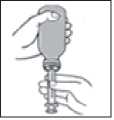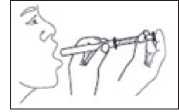Desmopressin 360 Micrograms/Ml Oral Solution
PACKAGE LEAFLET: INFORMATION FOR THE USER

CONSILIENT HEALTH m.

Read all of this leaflet carefully before you start taking this medicine because it contains important information for you.
• Keep this leaflet. You may need to read it again.
• If you have any further questions, ask your doctor or pharmacist.
• This medicine has been prescribed for you. Do not pass it on to others. It may harm them, even if their symptoms are the same as yours.
• If you get any side effects, talk to your doctor or pharmacist. This includes any possible side effects not listed in this leaflet. See section 4.
What is in this leaflet:
1. What Desmopressin 360 micrograms/ml oral solution is and what it is used for
2. What you need to know before you take Desmopressin 360 micrograms/ml oral solution
3. How to take Desmopressin 360 micrograms/ml oral solution
4. Possible side effects
5. How to store Desmopressin 360 micrograms/ml oral solution
6. Contents of the pack and other information
1. WHAT DEsmopREssIN 360 micrograms/ml
oral solution is and what it is used for
The ingredient that makes Desmopressin oral solution work (the active substance) is called desmopressin. Desmopressin is very similar to a substance that is produced naturally in the body (the pituitary hormone vasopressin), which temporarily reduces the amount of urine produced by the body. This medicine is intended for oral use only.
Desmopressin is used to treat:
• Central diabetes insipidus, a disease characterised by causing extreme thirst and continuous production of large volumes
of dilute urine as a result of an insuficient production of the hormone vasopressin.
• Bed-wetting (involuntary nightly urination or primary nocturnal enuresis) in patients older than
5 years with normal capacity of concentrate urine.
2. WHAT You NEED To
know before you take desmopressin
360 micrograms/ml
oral solution
Do not take Desmopressin:
• if you are allergic (hypersensitive) to desmopressin or any of the other ingredients of this medicine (listed in section 6).
• if you drink unusually large amounts of fluid (have habitual or psychogenic polydipsia)
• if you take medicines which increase urine production (diuretics),
• if you suffer from heart problems.
• If you suffer predisposition or have low level of sodium in your blood (hyponatremia)
• if you suffer from reduced kidney function
• if you have uncontrolled blood pressure
• if you suffer from the “Syndrome of Inappropriate high Secretion of Antidiuretic Hormone” (SIADH)
Warnings and precautions
Talk to your doctor or pharmacist before taking Desmopressin.
When taking Desmopressin, avoid excessive fluid intake because it may lead to a build-up of water in the body and/or decrease in blood sodium with or without side effects (see section 4 - Possible side effects).
Special care with Desmopressin is required to avoid build-up of water in the body and decreased blood sodium:
• If you are elderly
• If you have a medical condition causing fluid and/or electrolyte imbalance in the body, such as an infections, fever, stomach upset. If you suffer from a serious bladder problem or impaired urine outflow
• If you suffer from asthma, epilepsy and migraine
• If you have reduced renal function and / or cardiovascular disease. In chronic renal disease the antidiuretic effect of Desmopressin would be less than usual.
other medicines and Desmopressin
Tell your doctor or pharmacist if you are taking, have recently taken or might take any other medicines, especially:
• tricyclic or SSRI antidepressants (used to treat depression)
• carbamazepine (used to treat epilepsy)
• chlorpromazine (used to treat psychosis or schizophrenia)
• medicines for pain and/or inflammation called nonsteroidal anti-inflammatory drugs (NSAIDs) e.g. indometacin, ibuprofen, acetylsalicylic acid.
• loperamide (used to treat diarrhoea),
• diuretic agents.
These medicinal products increase the risk of build-up of water, which dilutes the salt in the body.
• Dimeticone (used in the treatment of due to intestinal gas), due to decreased absorption of desmopressin.
Desmopressin with food and drink
At low doses, Desmopressin may be affected by food intake. If you notice that Desmopressin is less effective, then you should take medicine without food before increasing the dose.
When using this medicine for bed-wetting keep your fluid intake to a minimum from 1 hour before you take the Desmopressin dose until 8 hours after a dose.
pregnancy, breast-feeding and fertility
If you are pregnant or breastfeeding, think you may be pregnant or are planning to have a baby, ask your doctor or pharmacist for advice before taking this medicine.
It is preferable to avoid using Desmopressin during pregnancy.
Desmopressin passes into breast milk. If you are going to be treated with desmopressin, you should stop breast-feeding.
Driving and using machines
Desmopressin does not affect your ability to drive and use machines.
Important information about some of the ingredients of Desmopressin
This medicine contains methyl parahydroxybenzoate and propyl parahydroxybenzoate, which may cause allergic reactions (possibly delayed).
3. HoW To TAKE
desmopressin
360 micrograms/ml
oral solution
Always take this medicine exactly as your doctor has told you. Check with your doctor or pharmacist if you are not sure.
usual doses
Treatment of central diabetes insipidus:
Adults and Children: Your doctor will prescribe the dose most suitable for you. The usual starting dose is
0.25 ml (90 micrograms) three times daily. Subsequently, the doctor will adjust the dose according to individual patient response. The usual daily dose is between 0.5 ml (180 micrograms) to 3 ml (1080 micrograms) of Desmopressin. The maintenance dose ranges from 0.25 to 0.5 ml (90 - 180 micrograms) of Desmopressin three times per day.
It is important to note if symptoms of build-up of water in the body and / or decreased blood sodium appear (see section 4 - Possible side effects). If so, treatment will be stopped and the dose will be changed.
Bed-wetting (involuntary nightly urination or primary nocturnal enuresis) in patients older than 5 years:



Adults and Children: The usual starting dose is 0.5 ml (180 micrograms) of Desmopressin one hour before bedtime. The dose may be increased up to 1 ml (360 micrograms) of Desmopressin if the starting dose is not enough. The need for continued treatment is normally checked every three months by introducing a treatment free period of at least one week.
Elderly: If the doctor decides to treat you, your blood sodium levels should be measured before and three days after starting the treatment and if the dose is increased or at any time your doctor finds it necessary.
Monitoring the fluid intake is important. If symptoms of the build-up of water in the body and / or decreased blood sodium occur (see section 4 - Possible side effects), discontinue treatment.
Once treatment is restored, fluid intake will be rigorously controlled.
instructions for use:
1. Open the bottle (in the first opening the seal is broken).
2. Insert the oral syringe into the pourer and turn the bottle upside down to fill it with the dose to be administered.
3. Take the oral syringe out of the bottle and check to see that the correct amount appears in the bottom of the syringe.
4. Hold the syringe to your mouth and release the dose into your mouth.
5. Rinse with water after each use and close the bottle. Keep the bottle in the outer carton to protect from light.
if you take more Desmopressin than you should
An overdose may lengthen the effect of desmopressin and increase the risk of water build up in the body and / or low levels of sodium in your blood. Symptoms may include headache, nausea and vomiting, weight gain and in severe cases convulsions. It is recommended to stop the treatment, restrict fluids intake and a symptomatic treatment if necessary.
If you take more Desmopressin than prescribed, contact your doctor or pharmacist immediately.
if you forget to take Desmopressin
If you have any further questions on the use of this medicine, ask your doctor or pharmacist.
4. possible side effects
Like all medicines, this medicine can cause side effects, although not everybody gets them.
Stop taking Desmopressin and see a doctor or go to a hospital straight away if the following occur:
• common (occurs in less than 1 in 10 users): symptoms of a build-up of water in the body such as unusually bad or prolonged headache, feeling or being sick, unexplained weight gain and in serious cases, fits, and unconsciousness.
• Very rare (occurs in less than 1 in 10,000 users): allergic reactions such as rash, itching, fever, swelling of your lips, face, throat or tongue causing difficulties in swallowing or breathing.
Tell your doctor or pharmacist if
you notice any of the following other side effects:
• Very common (occurs in more than 1 in 10 users): headache.
• common (occurs in less than 1 in 10 users): abdominal pain, nausea.
• Very rare (occurs in less than 1 in 10,000 users): emotional disturbances in children, allergic reactions.
If you get any side effects, talk to your doctor or pharmacist. This includes any possible effects not listed in this leaflet. You can also report side effects directly via Yellow Card Scheme. Website: www.mhra. gov.uk/yellowcard. By reporting side effects you can help provide more information on the safety of this medicine.
5. how to store desmopressin
360 micrograms/ml
oral solution
Keep this medicine out of the sight and reach of children.
Do not store above 30°C. Store in the original package.
After first opening, the product should be stored below 25°C for up to 4 weeks.
Do not take this medicine after the expiry date which is stated on the label and carton after EXP. The expiry date refers to the last day of that month.
Do not throw away any medicines via waterwater or household waste. Ask your pharmacist how to throw away medicines you no longer use. These measures will help protect the environment.
• The other ingredients are:
- sodium methyl parahydroxybenzoate (E219),
- sodium propyl parahydroxybenzoate (E217),
- hydrochloric acid (for pH adjustment) and
- purified water.
What Desmopressin looks like and contents of the pack
Desmopressin is a clear solution filled into an amber glass bottle and capped with low density polyethylene (LDPE) pourer, provided with a high density polyethylene (HDPE) screw cap. The bottle contains 15 ml of solution. A graduated 1.5 ml dosing syringe is supplied in each pack. The syringe is graduated from 0 to 1.5 ml, with divisions of 0.1 ml. The graduation corresponding to the doses of 0.25 ml, 0.5 ml and 1.0 ml are specifically marked.
Marketing Authorisation Holder and Manufacturer
Marketing Authorisation Holder
Consilient Health Ltd.,
5th floor,
Beaux Lane House,
Mercer Street Lower,
Dublin 2,
Ireland
Manufacturer
Laboratorio Reig Jofre S.A.
Gran Capita 10
08970 Sant Joan Despi - Barcelona Spain
This leaflet was revised in 07/2014
Do not take a double dose to make 6. coNTENTs of THE pack up for a forgotten dose. AND oTHER information
if you stop taking Desmopressin What Desmopressin contains
Do not stop taking Desmopressin before completing the treatment as it may not have the expected effect. You should only change or stop your treatment if advised by your doctor.
• The active substance is desmopressin.
Each ml of the oral solution contains 360 micrograms of desmopressin (as acetate).
P0227